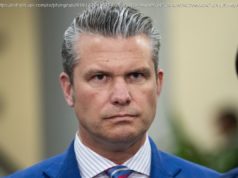Crown Prince Muhammad bin Salman has done what America has asked, and the president has assured him their relationship is safe.
Today the president of the United States released a statement reaffirming his support for Saudi Arabia and its regent, Crown Prince Muhammad bin Salman, known as MbS. The process of separating the substance of the document from its mortifying semiliteracy took me approximately 15 minutes, but I think I managed it without permanent damage to the Broca region of my brain. There lies the seat of the language faculty, easily the most punished neuroanatomical structure of the Trump era. Here’s what close study reveals.
We knew—we always knew—that Donald Trump would never ditch an ally who would always support him as long as he reciprocated with loyalty of his own. MbS is such an ally. Recall that Trump’s first foreign trip was to Saudi Arabia, a curious choice for a president widely believed to hate and distrust Muslims. His love for MbS is a romance that is perpetually new, a cloudless day of picnics in the park, sweet-nothings of arms- and oil-deals, and promises of mutual defense. The affirmation of this relationship should be read not as the product of deliberation but as an exercise in apologetics: an explanation of a decision that was never in doubt, even if the explanation proved inadequate. All of Trump’s romances are like this. That is why his supporters love him; he loves them back unconditionally—whether they are racist or murderers or cretins.
But let’s examine the issues with Saudi Arabia that required this apologia. They are broadly divisible into three parts: (1) military, (2) economic, and (3) the assassination of the Saudi dissident and journalist Jamal Khashoggi.
Read: Why the U. S. can’t quit Saudi Arabia
Trump begins with a foreboding message. “The world is a dangerous place!” he writes, at his most Churchillian. He characterizes the war in Yemen as a “proxy” war in which the American enemy Iran and the American ally Saudi Arabia have met on a field of battle. The Saudis, he says, have kept Iranian interests in check by fighting in Yemen. The analysis does not achieve greater granularity—the Houthis may be Iranian allies without being Iranian proxies—but it is broadly correct. The destruction and immiseration of Yemen, including the starvation of children and other civilians, is a price Trump regards as a good deal for the inhibition of Iranian interests.
American economic entanglements with Saudi Arabia go back for many decades, and in this sphere too what Trump says is not entirely wrong, although he exaggerates well past the point of dishonesty. The Saudis, he writes, “agreed to spend and invest $450 billion in the United States.” In other words: our friendship is too sweet to spit out, no matter how poisonous it may be. Trump has a propensity to lie about the magnitude of these deals, and in any case he tends to speak of these deals as if they were grants, rather than mutually beneficial arrangements that should increase American sway over Saudi Arabia, rather than force the United States into permanent Saudi enfeoffment and automatic concession to the Kingdom’s demands. If the Saudis have invested $450-billion, does not the United States have more sway over them, rather than less? (The Saudi role in global energy markets, of course, remains formidable, even if it is now proportionally smaller than that of the United States and Russia.)
And then, finally, comes the matter of Khashoggi. On October 2, a team of Saudis murdered Khashoggi, almost certainly in the Saudi consulate in Istanbul. I have written previously about the possibility that Khashoggi was accidentally killed in a botched attempt to sedate and render him to Riyadh, and about the preposterous striptease to which Turkey has subjected the world, as it leaked out lurid unverified details about how the killing might have happened. (Was the killing immediate, or preceded by a Skype conversation with the Saudi adviser Saud al-Qahtani? Did the assassins cut off his fingers? Is there a recording of the whole grisly ordeal—or only of one of the assassins’ confirming, vaguely, that the “job is done”?) The Turks caught the Saudis in an evil and inexcusable plot, one that (perhaps even worse) was executed with all the grace and competence of a team of howler monkeys on methamphetamines.
Read: The U. S.-Saudi relationship is out of control.
The CIA recently leaked its own assessment, which stated that MbS ordered the Khashoggi operation. This leak was calculated to ensure that Trump’s semiliterate valentine to MbS would be maximally awkward, a love-letter to a killer. Trump’s statement concedes that Khashoggi’s killing was “an unacceptable and horrible crime.” He adds that “our intelligence agencies continue to assess all information, but it could very well be that the Crown Prince had knowledge of this tragic event—maybe he did and maybe he didn’t!” This sentence is the ultimate transformation of the American government into a form of reality television. The CIA reports—you decide! Trump neglected only to tell readers how to register their votes.
But, again, the decision was rigged from the beginning. Trump’s alliance with Saudi Arabia long predated his awareness of who Khashoggi was, and the death of a single dissident was never going to freeze into hibernation a romance that was forever spring. Although the murder was indefensible, the relationship (Trump argues) is not. To have an alliance with Saudi Arabia against all forms of Islamism, he suggests, is worth the life of a dissident or two.
And here is the brutal truth behind this amoral love affair: MbS has done what America has asked. Fourteen years have passed since Michael Moore’s risible film Fahrenheit 9/11 —long enough to erase America’s collective memory of the complaint against Saudi Arabia that formed the crooked spine of that pseudodocumentary. Saudi Arabia contributed 17 of the 19 hijackers on September 11; it encouraged jihadism while professing to be an American ally; it distorted American politics by wielding influence over the Bush family and the various corporate slaves to its oil industry.
Read: Trump’s evangelical advisors hear from the Saudi crown prince on Khashoggi
MbS, and his much-vaunted reforms of Saudi Arabia, are the response to these complaints. He has repressed, rather brutally, anyone with connections to Islamists—including Khashoggi, who never concealed his sympathy for what might be called “soft Islamism.” (The Saudis have accused him of belonging to the Muslim Brotherhood; he pointedly refused to deny the accusation, while maintaining, reasonably, that freedom of conscience would allow him to be a Brother if he wished.






